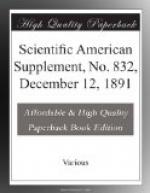The most desirable temperature for diffusion batteries is not yet definitely settled. Some manufacturers recommend 82 deg. to 86 deg. F. On the other hand, satisfactory results have been obtained at 145 deg. F., followed by cold water in the diffusors.
The use of hydrofluoric acid, even in small quantities to prevent fermentation, should not be allowed.
It is proposed to use hydrogen dioxide for saccharine juice purification. The alkalinity of juice is reduced to 0.07 by a judicious use of lime. Precaution must be taken to keep the temperature at 87 deg. F. After a preliminary filtration about 4 per cent. hydrogen dioxide is added. The whole is then heated to the boiling point, after which 1/2 to 1 per cent. lime is added. When alkalinity of filtrate is 0.03 phosphoric acid and magnesia are added, in quantities representing 0.03 per cent. of sugar in juice for magnesia, and 0.6 per cent. for the phosphoric acid. In working beet juices hydrogen dioxide may be used in the diffusor or during any phase of the sugar manufacturing process, even upon sugars in centrifugals. In all cases the results obtained are said to be most satisfactory.
A method to crystallize the sugar contained in the mother liquor of a masse cuite consists in mixing during 24 hours the hot product, direct from the pan, with low grade molasses. Gradual cooling follows. The crystals of masse cuite effect a crystallization of the otherwise inactive product contained in the molasses. The separation of crystals from adhering molasses is done in a special washing appliance arranged in battery form.
It has been frequently asked if the existing and accepted formula for determining in advance the amount of refined sugar that may be extracted from either beets, masse cuite or raw sugar, is to be considered exact, without special allowance being made for raffinose. An intelligent discussion upon the subject shows that the sugar in question, whether present or not, in no way influences the formula under consideration.
AUSTRIA-HUNGARY.
The committee on exhibition at Prague has issued several interesting pamphlets, from which we learn that in Bohemia, in 1819, there existed one beet sugar factory. In 1890 the total number of factories was 140; last year 370,000 acres were planted in beets, and the yield was 3,700,000 tons; yield of sugar averaged 2,700 lb. per acre; 40,000 hands were employed. During the past 24 years 17,900,000 tons of coal have been consumed, and the working capacity per factory is now far greater than formerly. There are at present seven sugar refineries in Bohemia.
Commercial arrangements with Germany having terminated favorably, great pressure is being brought to bear upon Italy, Roumania, Servia and Switzerland, to induce them to enter into a treaty. Sugars imported by the country last named were 35,892 tons in 1889 and 43,300 tons during 1890.




